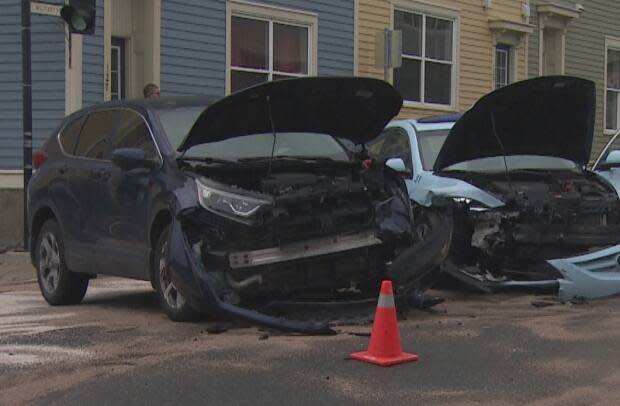Collisions plummeted in N.L. last year, but don't count on lower insurance costs

To no one's surprise, statistics reveal that collisions in areas patrolled by the Royal Newfoundland Constabulary in Newfoundland and Labrador plummeted last year as drivers stayed home because of the COVID-19 pandemic.
But if you think that will mean lower insurance rates, you might want to shift that thought into park.
In fact, one company that analyzes car insurance price quote trends in Canada released a study last month that suggests rates went up in Atlantic Canada last year.
However, the rate of increase was notably lower than in the pre-pandemic era, and insurance companies have boasted about giving millions in rebates and premium deferrals to policy holders.
Canada-wide, it was a similar pattern, though price quotes in the fourth quarter of 2020 were below those of 2019, and Ontario drivers benefited the most from lower rates.
'Not a good trend'
A spokesperson for HelloSafe.ca, an insurance comparison website based in Paris that launched in 2014 and expanded into Canada last year, said the Atlantic Canadian findings are "quite surprising."
"It's not a good trend," said Alex Desoutter.
Research by HelloSafe found that price quotes in Atlantic Canada increased by 13 per cent in the first quarter of 2020, 11.5 per cent in the second quarter, eight per cent in the third quarter, and 2.6 per cent in the fourth quarter.
While the trend was positive for drivers worried about their pocketbooks, Desoutter said he was surprised rates didn't sink lower.
"Many drivers couldn't use their cars during the pandemic, and we should expect a general decrease in prices."
If the trend continues, he said, "we can expect for 2021 a decrease in prices for drivers in Newfoundland and all across Canada."
But that's not a certainty, according to the trade association that represents auto, home and business insurance companies in Canada.

A true picture of the trends for 2020 will not be available until the General Insurance Statistical Agency releases its per-province statistical breakdown of insurance claims, which will likely happen in June, said Amanda Dean, Atlantic vice-president of the Insurance Bureau of Canada.
Dean said insurance companies will then use this data as it prepares to submit rate applications to various regulatory agencies across Canada, including the Public Utilities Board in Newfoundland and Labrador.
Claim severity on the increase
Dean said it appears there was a decrease in claims, but in many cases, the severity of claims increased.
"Some individuals were taking the opportunity of vacant roads to drive at excessive speeds, so it stands to reason the severity, the cost of claims would increase because you increase speed and you increase the impact," Dean said recently during an interview from her Halifax office.
While it does not have any official data, HelloSafe estimates that insurance companies in Canada paid out $2.7 billion less in claims last year.
Desoutter estimates the savings in Atlantic Canada at nearly $350 million.
St. John's personal injury lawyer Steve Marshall believes insurance companies did very well last year, saving big not only on insurance claims, but on Section B medical benefits for treatments such as physiotherapy, which were not available for long periods last year because of pandemic lockdowns.
"You're certainly upwards of a half a billion in total — B as in Bob — in savings during the pandemic," said Marshall.
"I just got my renewals. My rates didn't go down. So I don't know. I guess they keep that money and put it in their profits."
Indeed, data compiled by the RNC, whose coverage area includes the northeast Avalon Peninsula, Corner Brook, Churchill Falls and Labrador City, suggests there was far less mayhem on the roads last year.
Collisions down by 40 per cent
While the numbers are still preliminary, the RNC reports there were 1,330 collisions in 2020 that resulted in property damage. In 2019, the number was 2,259 — a decline of roughly 40 per cent.
That said, Marshall said N.L. drivers don't have it that bad when it comes to insurance.
"For a million dollars protection for you and your family, compare that. I'm not saying it's a good deal. It's still a lot of money. But relatively speaking, car insurance in Newfoundland and Labrador is still a good deal," he said.
But Amanda Dean denies any suggestion that insurance companies were greedily profiting from the pandemic.
"Here in Atlantic Canada, from the start of the pandemic to Dec. 30, insurers gave back $80 million, and deferred another $8 million in premiums. So not insignificant numbers," she said.
As for medical benefits, Dean said, "there were still claims happening.… Section B was still being used."
What's more, she said, vehicle traffic patterns are slowly returning to pre-pandemic levels, especially in rural areas, and the longer-term trend in Newfoundland and Labrador has been one of steadily increasing claims payouts by insurance companies.
Some of the increases in 2020 were likely the result of regulatory rulings prior to the arrival of the pandemic, Dean explained.
She noted that many insurers voluntarily paused some of those increases because of the pandemic.
But vaccination rates are climbing, and hope is rising that an end to the pandemic is in sight.
"So if a rate increase is required because of claims history within that province, and that insurers' experience, they will be filing for it," said Dean.
"And it's important to note that just one or two years of claims experience doesn't typically impact what is happening in terms of rate filings."

 Yahoo Movies
Yahoo Movies 